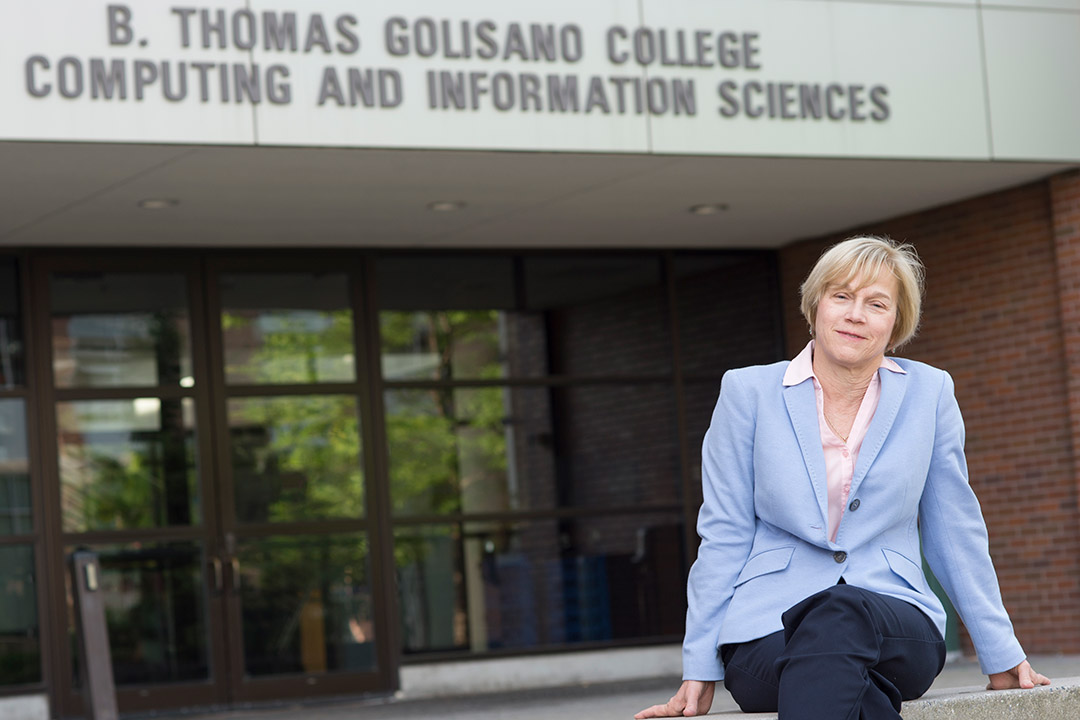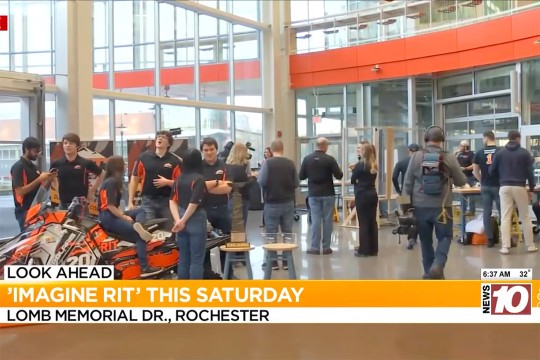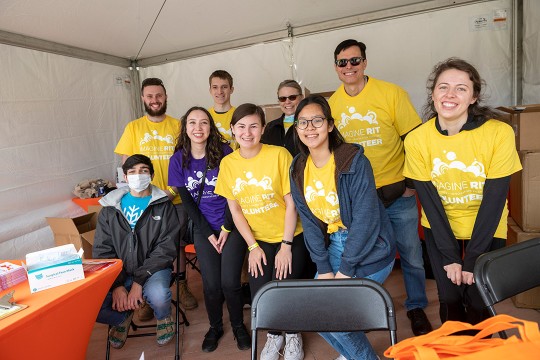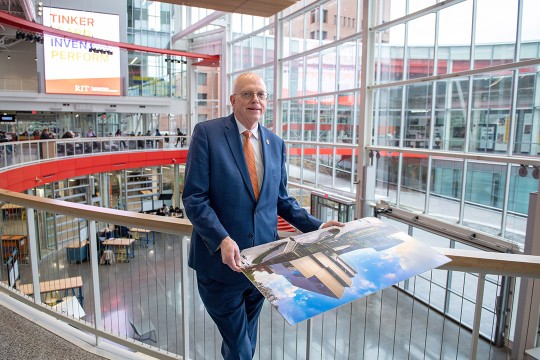Tiger Talk: Anne R. Haake
Elizabeth Lamark
Anne Haake is the dean of the B. Thomas Golisano College of Computing and Information Sciences.
Anne R. Haake became dean of the B. Thomas Golisano College of Computing and Information Sciences on April 1. She had been serving as interim dean since July 2015. The appointment made her the first female dean of the college, home to RIT’s School of Interactive Games & Media and computer science, information sciences and technologies, software engineering and computing security departments. Here she talks about her background, research experience and plans for the college.
I grew up in Scottsville, N.Y., and my dad was the Scottsville town doctor. I went to Colgate University and studied biology. I was always interested in life sciences.
I got inspired by a faculty member who gave me an opportunity to work in a lab. He studied a fungus that threw its spores. One job was measuring how far these spores went. He also had me doing some biochemistry.
I have always loved school and I wanted to be a professor. That was probably my motivation to go to graduate school, rather than just research, because that’s the way you get to be a professor. You go get a Ph.D.
I went to the University of South Carolina. I did both my master’s and Ph.D. studying feather and scale development in chickens that had a mutation. It’s called the scaleless mutant chicken. That’s the power of genetics. You study something that is abnormal and that helps reveal the normal process.
We moved back to Rochester in June 1986 and I was an instructor and fellow at the University of Rochester Medical School. I was in the department of dermatology, getting more into understanding human skin development and disease. I was there 14 years.
The late ’80s to ’90s were when molecular biology really took off—genomics and gene sequencing, along with the Internet. That’s really what made me do a master’s part time at RIT in the information technology department. Biology was one of the first to become a digital information science because the genome is essentially strings of characters that carry information. Computing became very important.
I had just finished my degree and I got an opportunity to adjunct here. The thing that was really interesting to me was the whole area of human-computer interaction because it is very scientifically based. Say, for example, you are designing systems for biologists or doctors, you still have to understand their point of view in order to design well. I never wanted to leave behind everything I had done. I was looking for ways to combine it.
IT hired 11 people in 2000. I knew I wanted to do something different, so I applied and got an interview, gave a seminar on my ideas for bringing computing into life sciences and I got offered the job.
I wanted to do more computing research, so I did a mini-sabbatical at the NIH in 2007-08. I did two months at the National Library of Medicine, and I worked with the communications engineering branch. I went to work with a group that works on images and trying to retrieve biomedical images and make them useful for doctors and scientists. I helped them out with their user-interface design and usability studies of that. That brought the biomedical back to the computing.
Being a dean was never in my game plan. I tell my kids—always have a plan B. You never know what the next opportunity will be, and it’s good to be prepared.
Part of our mandate is to grow our research. GCCIS faculty and students are engaged in interdisciplinary research in cybersecurity and personalized health care technology, and we also have research emphasis in computing for accessibility, computing education and computing theory, among others.
Another area of focus is diversifying all of our programs. We have already made great strides with women in computing.
My primary approach is to be collaborative and to enable the people in the college to reach their best. I like to find opportunities for people. I like to put things together and find who can do it.
Education
Anne Haake received a bachelor’s degree in biology from Colgate University and a master’s and Ph.D. in developmental biology from University of South Carolina. She was a postdoctoral fellow at the University of Rochester School of Medicine & Dentistry. She also completed the master’s in software development and management at RIT, while on the faculty at the University of Rochester School of Medicine & Dentistry.
Academia
At RIT, Haake has served in interdisciplinary curriculum development roles for several programs, including bioinformatics, medical informatics, the Ph.D. in computing and information sciences and the human-computer interaction master’s program.
Research
She has been a leader in interdisciplinary research, as principal investigator of National Science Foundation and National Institutes of Health-funded research and as a mentor for undergraduate and graduate student research. In 2012, she was named RIT’s first National Science Foundation Expert in the foundation’s Division of Biological Infrastructure and served as a program director for the division.















